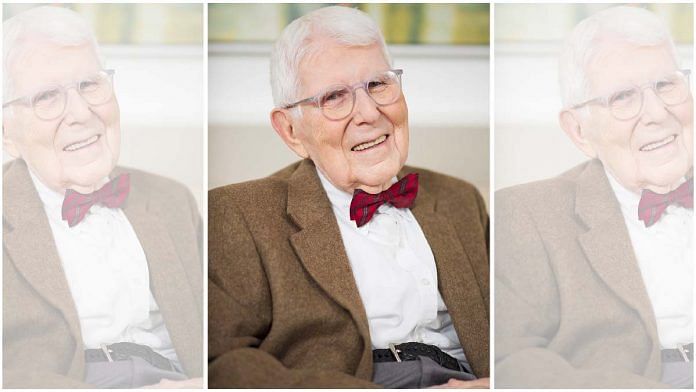Bengaluru: Dr Aaron Beck, the American psychiatrist who developed cognitive behavioural therapy (CBT), died on 1 November at the age of 100.
CBT is used to treat a variety of psychological disorders and psychiatric problems, including depression, and Beck is credited with changing the entire field of mental health through the method, which he developed as a combination of cognitive therapy and behavioural therapy in the 1980s and 1990s.
Beck authored — by himself and with co-authors — over 600 published research papers in the field of mental health, and was the recipient of numerous prestigious mental health research awards, including the Albert Lasker Award for Clinical Medical Research in 2006.
In 1994, he co-founded the Beck Institute for Cognitive Behavior Therapy with his daughter, famed psychologist Judith S. Beck. The institute is a non-profit in Philadelphia that provides training and resources for CBT, and conducts research into it.
ThePrint explains what is CBT and what are its benefits, for which the world of mental health owes Beck a debt of gratitude.
Also read: Pets did help with your mental health during the Covid-19 pandemic. Here’s how
What is CBT?
CBT is an intervention technique whose objective is to improve mental health and equip people with the ability to overcome daily challenges.
It was developed initially to treat depression, but is today used to treat a wide variety of mental and mood disorders, including anxiety. It has also been effective in treating eating disorders, personality disorders, substance use disorders, obsessive-compulsive disorder (OCD), tics, suicidal thoughts, post-traumatic stress disorder (PTSD), gambling addiction, smoking, chronic lumbago or lower back pain, and anxiety associated with fibromyalgia.
CBT focuses on helping people challenge negative patterns in their thinking and beliefs, such as magnifying negative feelings, catastrophising, and over-generalising. Such negative thoughts, which do not accurately reflect reality, are known as cognitive distortions, and lead to emotional distress and self-defeating or self-destructive behaviour.
CBT challenges negative thoughts and encourages individuals to recognise cognitive distortions and reduce their impact.
It is a combination of behavioural therapy and cognitive therapy, where the former aims to identify and change self-destructive behavior, while the latter does so with thoughts. Beck also developed cognitive therapy.
The technique contrasts with psychoanalysis or Freudian analysis by focusing on a problem-solving approach rather than attempting to understand an individual’s thinking, behavior, and personality as a whole. Psychoanalysis was developed by Sigmund Freud in the 1890s, and typically entails a patient lying on a couch and talking about any subject they wish to, while the analyst or therapist remains out of the patient’s field of view. The process is much longer than CBT or just behaviour therapy, often lasting years, and delves deep into a person’s childhood, dreams, aspirations, trauma and more.
After a number of scientific studies in the 1990s, CBT started to become more widespread, both thanks to its focused approach as well as its cost-effectiveness when compared to psychoanalysis.
Beck’s cognitive triad
Beck’s cognitive triad, also known as negative triad or depressive cognitive triad, makes up the core of CBT and postulates that three factors work in a feedback loop and affect each other, presenting and magnifying themselves during depression and anxiety.
These are negative thoughts about the world, negative thoughts about the future, and negative thoughts about one’s own self.
Negative thoughts often lead to cognition distortion or cognition biases, some of which are common. These include magnification or exaggerating the importance or impact of a negative event, minimisation or underplaying a positive event, personalisation or attributing responsibility of a negative impact to oneself, and arbitrary inference or drawing conclusions based on insufficient evidence.
Therapy through CBT identifies such negative thought patterns and then aims to implement the practice of new skills that can be applied in real-world situations for coping when such thoughts arise.
Beck also developed the Beck Depression Inventory, a 35-point questionnaire that is often considered to be a standard test for gauging the level of depression in individuals.
(Edited by Shreyas Sharma)
Also read: Violence and mental health are likely to get worse in a warming world



